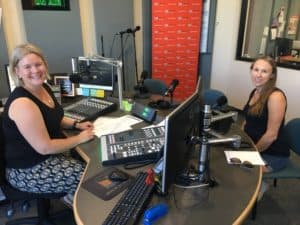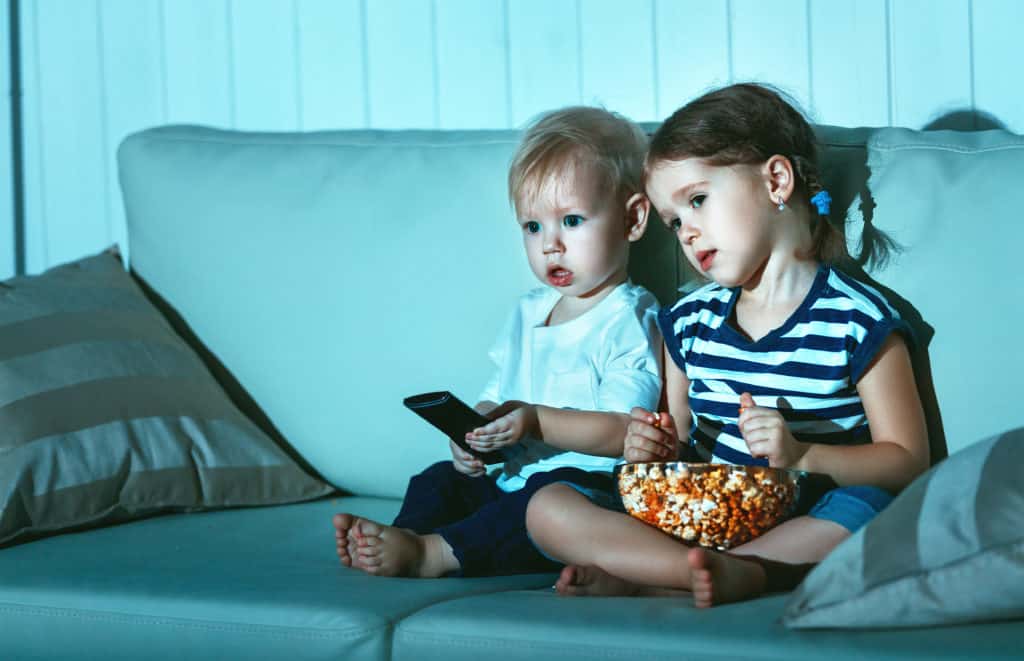I was recently invited onto the ABC Riverland to speak about “Screen time” and how it is affecting children and adults. Kerrie Lush and I had so much to talk about, we actually ran out of time.

Screens are such a part of our everyday life now; they are necessary to run a business, for children in schools, they are used as a way to ‘wind down’ after work, they’re in doctors surgeries, offices, we use them to communicate with the world. So…
How does screen time affect us?
Blue Light
Screens include televisions, computers, phones and tablets. They all emit light which is a the blue end of the spectrum. This wavelength of light is quite short and sharp and even if you don’t understand wavelengths and the physics behind it, this type of light is very stimulating for our brains. It puts us in an alert (“fight or flight”) state. This can cause sleeping issues, which may not be just problems falling asleep, but a restless or light sleep can result as well.
I understand that sitting down watching some TV or scrolling through Facebook allows some people to wind down, but there is a lot more happening below the surface of the body, neurologically, that can be harmful.
Posture
The position that we are in when sitting in front of a screen: that might be a TV semi-reclined which can put pressure on the lower back, scrolling through our phone with our head bend forwards affects neck posture (headaches, shoulder tension, neck ache), at a computer with our shoulders hunched forwards or leaning forwards onto the desk.
For every centimetre the head moves forward (past the lateral posture line), there is an extra 4 kilos of load placed on the upper back. Hence, a significant forward head posture will trigger headaches and “shoulders that feel like concrete.” I am seeing so many young, really young children with very poor posture and its due to screen time.
Addiction and Brain Chemicals
When playing games on screens, neurotransmitters (brain chemicals) particularly those associated with pleasure and addiction, are released in the brain. Dopamine is one such chemical and it is related to relieving stress and pain. This means when a phone or tablet is taken suddenly, or there’s a loss of power, it’s almost painful. That’s when children scream. And it doesn’t matter if you’ve promised them (or yourself) “only 5 minutes”, those 5 minutes mean nothing in that screen world. This is why kids lose it when you try to take the phone from them mid-game. They feel like they’re about it hit a new high. Adults get the same feeling, but they can rationalise it a bit easier.
The games we download are there to make money, even if you’re on a ‘free’ app. As a result, they are also designed, very cleverly I might add, to be addictive. The more time you spend playing that game, the more third parties will pay for advertisements, the more money they make. The games draw you in: play one more round, get to the next level, get that next trophy, beat your score, try again, just 5 more minutes!
Adult addiction can also contribute to children’s addiction and it happens quicker than you think. Part of this is role-modelling. Children naturally want to do what their parents are doing and be like them. But also, parents who are attached to their screens are also detached from real life. Children feel this detachment and actually attach by default to devices.
Boredom is essential for Creativity and Imagination
Parents often feel guilty when their children are bored. There is this expectation that children must be kept occupied and busy and learning and active all the time. Actually boredom is essential for creativity and imagination. This also includes empathy and putting ourselves in others’ shoes. Having time to be bored is so essential in children’s development. “I’m bored” *insert whiny voice* may be the most frustrating thing to hear, but it’s actually a good thing. They just need to be encouraged to make their own fun.
In the 1980’s, a large scale study was carried out in Canada. Television was slowly being extended across the country, but it presented a great opportunity to research the difference in communities with different television availabilities. There were three communities: one with four channels, one with one channel and one with none. The community was studied just before one of the towns obtained television for the first time, and again two years later. “The children in the no-TV town scored significantly higher than the others on divergent thinking skills, a measure of imaginativeness. This was until they, too, got TV – when their skills dropped to the same level as that of the other children.”
How does Screen time impact children’s development?
Screens are flat and our world is three-dimensional. Playing games, no matter how educational, limit gross motor, fine motor and spatial skills. Games on phones and tablets for example use one maybe two fingers. Compare this with building with lego or blocks or colouring in an actual page of paper, there is more hand-eye coordination, more of the body being used, more dynamic movements.
The speed of movement on the screen whether it be movies or programs on the TV or games, contributes to attention deficit as the world does move at a slower pace. This leads to decreased concentration, focus and memory, due to brain changes particularly in the frontal cortex of the brain.
Between 0 and 2 years, infant’s brains triple in size, and continue in a state of rapid development to 21 years of age. Evidence suggests that watching television in the first 2 years of life may be connected with delays in language development.
This may affect babies in the following ways:
- Limiting time for active play and learning
- Reducing opportunities for language development
- Reducing the length of time young kids can stay focused
- Affecting the development of the full range of eye movement
No screen time is recommended for this age group.
For children 2 to 5 years of age, sitting and watching television and the use of other screens should be limited to less than 1 hour per day. It has been shown that that long periods of screen time are connected with:
- Less active, outdoor and creative play
- Slower development of language skills
- Reduced social skills
- Increased risk of being overweight
Between 6 years of age and adolescence, screen time should be limited to 2 hours per day. This will get harder and harder as school goes on as children are expected to be using computers for school work and screens (smart phones, tablets and computers) are used for communication and social interaction.
Obesity epidemic in children
Here are a few facts regarding obesity in children:
- At age 2-5, 8.8% of those born in 2010-2013 were obese, compared with 4.2% of those born in 1990-1993. Obesity has doubled in children before they even get to school!
- One-quarter (26%) of children and adolescents were overweight or obese in 2014-15. Imagine how this is setting up their health for the rest of their life!
- At age 10-13, 20.8% of those born un 2002-2005 were overweight or obese, compared with 23.9% of those born in 1982-1985. This figure would have risen in the last 10 years!
Figures from the Australian Institute of Health and Welfare.
While our high sugar, highly processed, low nutrition diet has a HUGE part to play, inactivity is also a major factor in obesity and weight issues. The more time children spend on a screen, the less time they are moving, playing sport and interacting. TV and video game use has been correlated in studies. As has television in children’s bedrooms. Sleep is also a major factor in weight gain, which leads me to the next point…
Technology in the Bedroom
No child needs technology in their bedroom, that includes TVs, phones, ipads, etc. Besides the fact that it tempts them to use it after lights out, there is a lot of radiation that comes off of those devices. There are more and more studies coming out about the dangers of EMFs (Electromagnetic field) EMFs come from mobile phones, wifi networks and anything connected to it, including power lines. They can cause insomnia, anxiety, dizziness and many other health issues. It’s been proven that children are more sensitive due to their developing nervous systems. While we can’t eliminate ALL of these sources of EMFs, it is certainly our responsibility to children and to ourselves to reduce exposure where possible.
As discussed above, using these devices at night before bed is what puts the brain in an alert state and while we might be able to sleep straight away, it’s not a good, restful deep sleep. But rather a light, half-alert sleep that doesn’t have the same benefits. Sleep deprivation and tiredness is a big issue for children and also adds to problems with focusing, memory and learning at school. Which again leads me to my next point of development…
How much screen time is too much?
Under 2 years – no screen time
2-5 years – no more than 1 hour a day
6 years + – the recommendation is consistent limits. I would say an hour a day for that age is enough too, but between 1-2 hours total.
Strategies for reducing ‘Screen time’ in children and adults
Children
A great way to end screen time, without the tantrums and tears is to slowly get into that world and bring them out of it. If the promise was 10 minutes, you might need to start a few minutes before that point. Sit down close next to them and start asking questions. You’re going into their world, but also slowly bringing them back to this one. Kids also love it when you ta
ke an interest in what they’re doing.
Watch them for 30 seconds to a minute. Ask an innocent question about the game or what they’re watching. Then introduce what’s next – bath time, dinner time, going outside. Give a little time but keep gently persisting.
Adults
Setting boundaries for yourself and being mindful of when you’re getting drawn in. Personally I don’t have Facebook on my phone right now. It comes and goes. For a week after deleting the app I find myself picking up my phone completely subconsciously. Until I realise, unless I want to check my emails for the 17th time that day, I put it back down.
I don’t have games on my phone. It stops me from distracting myself but also means when any child picks up my phone in hope, I can honestly say to them that there’s nothing interesting on there.
More Tips
- Remove all screens from the bedroom
- Have a curfew
- Keep meal times screen free
- Keep the car screen free unless it’s a longer trip (say more than 30mins)
- Limit non-work-related screen time
- Have ‘unplugged’ weekends
- Set clear boundaries for kids
- Provide other activities
- Be a role model for your kids
- If you must be on your screen at night time, there are apps and programs for computers and devices that will reduce the blue light and create a warmer red hue to the screen:
- Nightshift mode on iPhones
- Twilight on android devices
- Flux on computers

Summary of how screen times are affecting us:
- Posture
- Headaches
- Lower back pain
- Fight or flight response
- Sleep deprivation
- Distraction
- Blue light wavelengths
- Alert state of the brain
- Delayed development in Children, reduced:
- Social development
- Speech development
- Hand-eye coordination
- Attention and focus
- and a lack of boredom
- Obesity
- Addiction
Here’s another awesome article, complete with scientific links if you would like more information: 10 Reasons Why Handheld Devices Should Be Banned for Children Under the Age of 12
Also see Screen Time Studies Parents Should Know About (Guest Post by Meghan Owenz, PhD)
And because now you’re going to send the kids outside for some outdoor play, make sure you check out the post on shoes:
Shoes – are they the base of our problems?

